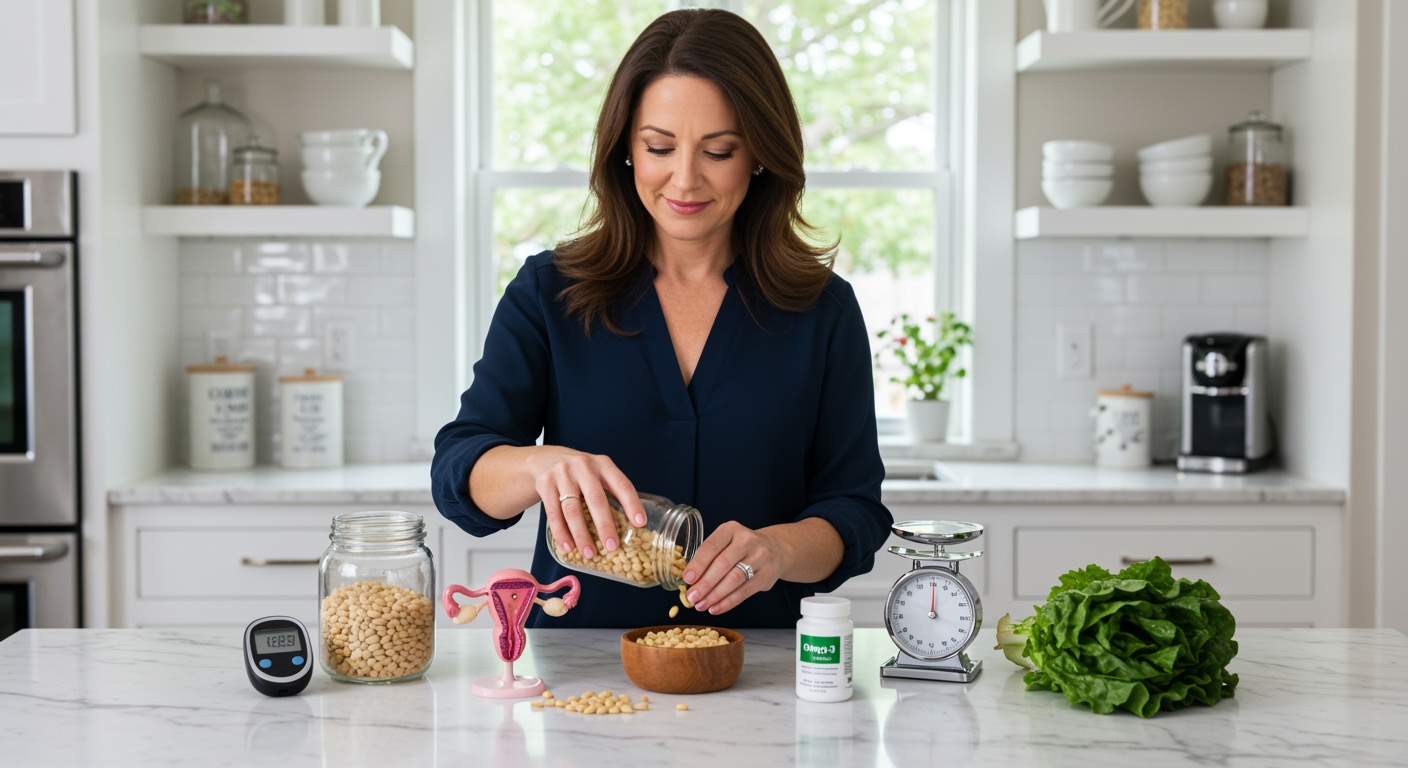✪ Key Takeaway: Pine nuts are safe and beneficial for PCOS when eaten in small portions due to their healthy fats and hormone-balancing nutrients.
Introduction
Pine nuts cost more than gold per pound, yet women with PCOS keep asking if these tiny treasures are worth the investment.
You might be wondering about pine nuts because you have heard conflicting advice about nuts and PCOS, or perhaps someone told you that expensive nuts work better for hormone balance.
Hi, I am Abdur, your nutrition coach, and today I am going to explain exactly why pine nuts can be a powerful addition to your PCOS management plan when used correctly.
What Makes Pine Nuts Special for PCOS?
Pine nuts contain the highest concentration of pinolenic acid among all nuts, which is a unique fatty acid that helps regulate appetite hormones.
This rare omega-6 fatty acid triggers the release of cholecystokinin and glucagon-like peptide-1, two hormones that signal fullness to your brain.
Research shows that pinolenic acid can reduce food intake by up to 36% within four hours of consumption, making it incredibly valuable for weight management in PCOS.
Pine nuts also provide 31% of your daily magnesium needs in just one ounce, and magnesium deficiency is common in women with PCOS.
The zinc content in pine nuts supports healthy insulin function and helps reduce inflammation markers that worsen PCOS symptoms.
Unlike other nuts, pine nuts have a perfect balance of omega-6 to omega-3 fatty acids that does not promote excessive inflammation when consumed in appropriate amounts.
✪ Fact: Pine nuts are actually seeds from pine cones, not true nuts, which makes them suitable for people with tree nut allergies.
How Do Pine Nuts Affect Insulin and Blood Sugar?
Pine nuts have a glycemic index of zero, meaning they do not raise blood sugar levels when eaten alone.
The combination of healthy fats, protein, and fiber in pine nuts actually helps slow glucose absorption from other foods when eaten together.
Studies demonstrate that consuming pine nuts before meals can reduce post-meal blood sugar spikes by up to 25% in people with insulin resistance.
The magnesium content in pine nuts directly supports insulin sensitivity by helping glucose enter cells more efficiently.
Pine nuts contain antioxidants like vitamin E and selenium that protect pancreatic beta cells from oxidative damage, preserving your natural insulin production capacity.
The pinolenic acid in pine nuts also influences incretin hormones, which help regulate blood sugar levels throughout the day rather than just after meals.
✪ Pro Tip: Eat 10-15 pine nuts 30 minutes before your largest meal to maximize their blood sugar stabilizing effects.
Can Pine Nuts Help Balance PCOS Hormones?
Pine nuts provide essential building blocks for hormone production, including healthy fats, zinc, and vitamin E that your ovaries need to function properly.
The zinc in pine nuts helps convert testosterone to its less active form, potentially reducing symptoms like acne and excess hair growth in PCOS.
Research indicates that adequate zinc intake can improve ovulation rates and menstrual regularity in women with PCOS within three months.
Pine nuts contain plant sterols that may help reduce elevated androgen levels by competing with cholesterol in hormone synthesis pathways.
The anti-inflammatory properties of pine nuts help reduce chronic inflammation that disrupts normal hormone signaling in PCOS.
Studies show that women who consume adequate amounts of healthy fats like those in pine nuts have more regular menstrual cycles and better fertility outcomes.
The selenium content in pine nuts supports thyroid function, which is often compromised in women with PCOS and affects overall hormonal balance.
✪ Note: Hormone balance improvements from pine nuts typically become noticeable after 6-8 weeks of consistent consumption.
What Are the Potential Risks and Side Effects?
Pine nuts are extremely calorie-dense at 673 calories per 100 grams, making portion control absolutely critical for women with PCOS trying to manage weight.
Some people experience pine mouth syndrome, a temporary metallic taste that can last 2-4 weeks after eating pine nuts, though this is harmless.
Eating more than one ounce of pine nuts daily can contribute to excessive omega-6 fatty acid intake, potentially promoting inflammation instead of reducing it.
Pine nuts from certain regions may contain higher levels of heavy metals like cadmium, so choosing high-quality sources is important.
The high fat content can cause digestive upset including nausea and diarrhea if you eat too many at once, especially if you are not used to high-fat foods.
Pine nuts can interact with appetite suppressant medications by amplifying their effects, potentially leading to inadequate calorie intake.
✪ Pro Tip: Start with just 5-10 pine nuts per day to assess your tolerance before increasing to the recommended one ounce serving.
How Should You Include Pine Nuts in Your PCOS Diet?
The optimal serving size for pine nuts is one ounce daily, which equals about 167 individual nuts or roughly three tablespoons.
Eat pine nuts as a pre-meal snack rather than adding them to already calorie-dense meals to maximize their appetite-suppressing benefits.
Toast pine nuts lightly in a dry pan for 2-3 minutes to enhance their flavor and make them more satisfying in smaller portions.
Combine pine nuts with low-glycemic foods like leafy greens, berries, or Greek yogurt to create balanced snacks that support stable blood sugar.
Store pine nuts in the refrigerator or freezer to prevent rancidity, as their high oil content makes them spoil quickly at room temperature.
Choose organic pine nuts from reputable suppliers to minimize exposure to pesticides and heavy metals that can worsen PCOS symptoms.
Track your pine nut intake using a food diary to ensure you stay within the recommended portion size while monitoring your body’s response.
✪ Fact: Fresh pine nuts should have a sweet, buttery aroma and creamy white color without any dark spots or bitter smell.
The Bottom Line
Pine nuts are not only safe for PCOS but can be incredibly beneficial when consumed in appropriate portions as part of a balanced diet.
The most expensive foods are not always the best, but sometimes they earn their price through unique nutritional benefits that cheaper alternatives cannot provide.
I would love to hear about your experience with pine nuts or any questions you have about incorporating them into your PCOS management plan, so please share your thoughts in the comments below.
References
At NutritionCrown, we use quality and credible sources to ensure our content is accurate and trustworthy. Below are the sources referenced in writing this article:
- Healthline: Pine Nuts: Nutrition, Benefits, and More
- Medical News Today: Pine nuts: Health benefits and nutrition
- WebMD: Health Benefits of Pine Nuts
- PubMed Central: The Role of Nutrition in Polycystic Ovary Syndrome





